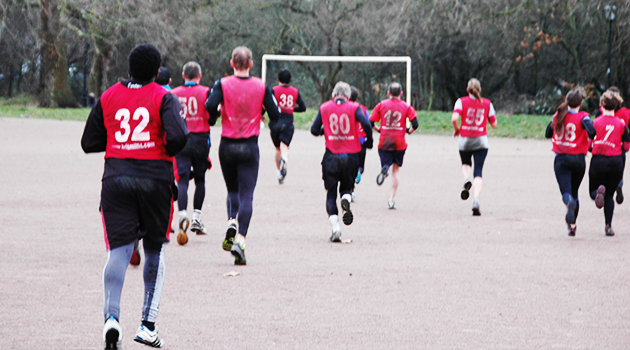
RUNNING TIPS FOR BEGINNERS
March 12, 2015
Topics:

Although it’s an activity we’re born to do, running isn’t easy for everyone. It’s important to build on your distances slowly if you’re new to running for fitness, as going too far too soon can have a negative effect on your progress. In fact, running a few kilometers every day can be even more beneficial than running longer distances twice a week. Here are some more tips for people looking to break into the wonderful world of running:
Warming up to running
Use body weight movements like squats and lunges to warm up. Try not to static stretch before you run, as this gets the muscles ready for a different kind of exercise, not the sort you’ll be doing when you hit the pavement. Dynamic stretches are far better and get your muscles excited and ready for the run ahead.
Be prepared
It’s always tempting to go shopping for the best gear when you’re starting out with a new activity. When it comes to running, it might be a good idea (for once). You don’t need top-of-the-line running shoes, but you most definitely do need trainers that are designed to support you as you go.
As Jonathan Beverly at Runners’ World puts it, ‘a shoe is a prescription’. Taking the time to get the right shoe for your individual needs is an essential step that will prevent injury and ensure you stick with your new exercise regime.

Move everyday
Get your body used to training. Exercising for a few minutes every day, even if that’s a brisk walk or yoga, will make it easier to get into the habit of running. And once you’re hooked you won’t be able to stop yourself.
Running can sometimes be as tough mentally as it is physically. Getting out and exercising consistently is hard at first, but the feeling you’re left with after missing a run is far worse than the feelings you get while you’re out.
Enjoy your rest days
Rest and recovery are a vital part of training. Stay active and keep moving but lower the intensity. Don’t be afraid of taking walk breaks on a longer run, or go for a stroll on the weekend if you’re feeling like you need a break. As long as you keep active in some way and don’t cheat yourself, you’ll be building positive habits.
Fuel yourself
You’re about to burn more energy than you’re used to. Getting your eating habits right will help prevent fatigue. Balance your diet with good quality protein to help repair and rebuild your working muscles, seasonal fruits and vegetables to boost your immune system and good fats such as olive oil and coconut oil. At a lower intensity you’ll utilise the latter as a fuel.
Be careful of carb overload
While carb loading is still popular with endurance athletes, it’s unlikely we’ll deplete our glycogen stores in shorter and lower intensity runs. Too many starchy carbs may leave us with energy peaks and the dreaded troughs that follow.
Set yourself a goal and get social
Will running ever get easier? Having a short-term goal when it comes to running can really spur you on when you find yourself asking those sorts of questions. It’s something to work towards and a light at the end of the tunnel. Sign up for a 5k or a fun run to give your training some purpose.
Running with friends is another incredibly effective way to keep the excitement in running. Joining a club or a program like BMF’s CROSSRUN will help you meet new people and introduce some accountability to your workout routine.
Enjoy it!
Trust the words of Kate Carter, the Guardian’s resident running expert:
‘Don’t stop after your first, second or even third run. They are literally the hardest you will ever do.’
Get past the initial hurdles to find a regular running schedule that works for you and you’ll be addicted to the sport in no time. Who knows – maybe marathons are on the horizon.
